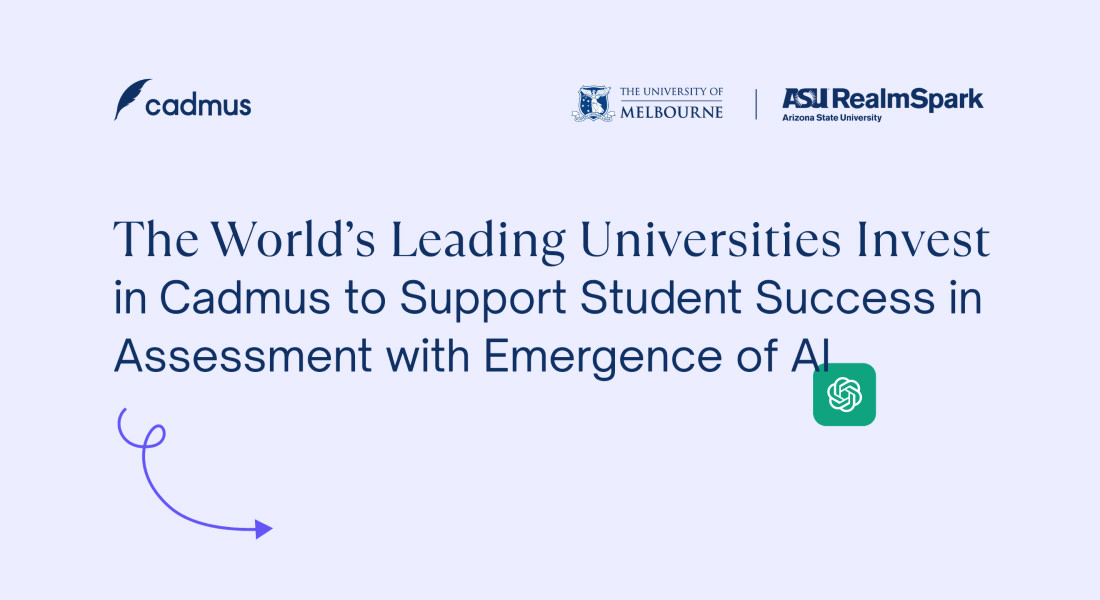Generative AI in education: Navigating risks, opportunities, and the future of learning

Generative AI is shaking up the learning process in ways we are only just beginning to understand. As a technology leader in the higher education space, Cadmus was thrilled to attend the Universities Australia Conference to discuss Generative AI Frameworks and Solutions in Higher Education with sector leaders from top universities.
A dynamic panel of experts came together to discuss the impact of AI on higher education and the need for a fresh approach to how we learn. The conversation featured Gregor Kennedy, Deputy Vice-Chancellor (Academic) at the University of Melbourne; David Sadler, Deputy Vice-Chancellor (Academic) at the University of Notre Dame Australia; Herk Kailis, CEO of Cadmus, a key player in the higher education tech world; and moderator Karen Nelson, Acting Vice-Chancellor at the University of Southern Queensland. These respected leaders shared their insights on the risks and opportunities AI brings to the table, offering thought-provoking ideas on how we can rethink education in the digital age.
“AI is challenging the fundamental basis of learning and teaching in our institutions,” moderator Karen Nelson, Acting Vice-Chancellor at the University of Southern Queensland, noted. “But as a sector we are good at collaboration, and that will be key to moving forward.”
From risk to opportunity: the initial AI response
The panelists agreed that the first wave of AI adoption in higher education was largely focused on mitigating the risks. In the past two years, when Generative AI began to hit its stride, universities quickly sought to understand how it could impact academic integrity, learning outcomes and, in turn, the implications for the workforce of the future. University of Melbourne’s Gregor Kennedy, reflected on this cautious approach: “When generative AI emerged a couple of years ago, most institutions—including mine—ran pretty hard at the risk. We worked closely with regulators to understand the implications, before gradually shifting to exploring opportunities.”
University of Notre Dame Australia’s David Sadler emphasised the delicate balancing act university leaders need to navigate in these ever-evolving times: “As a DVC, I have to balance the immediate assurance of learning outcomes with the longer-term cultural shift needed to make AI a valuable part of education.”
While initial concerns focused pretty heavily on AI-powered cheating, universities are now moving toward more holistic approaches. These approaches are focused on integrating AI into teaching, learning and assessment in responsible ways that scaffold transformative learning opportunities.
The need for a new approach to assessment
One of the most pressing challenges universities face is maintaining academic integrity in an AI-driven world. Gregor highlighted that across the sector, institutions are increasingly aligning on best practices for assessment transformation: “The key question is: Can we say, hand on heart, that students exiting our programs have achieved the intended learning outcomes? And that comes down to the question of academic integrity. That’s why we’ve focused so much on warranting and assuring assessment..”
David shared a striking example of how the University of Notre Dame Australia tackled a rise in academic misconduct cases within its nursing program. By implementing a pilot program with Cadmus, they introduced a framework that is resistant to AI misuse, while assuring assessment remained authentic and conducive to a good student experience. “We brought in Cadmus with two goals: reduction in the number of academic integrity cases and a positive staff and student experience.” David said the results from this initial pilot were impressive. “Just to give you some stats: initially we had 7.6% incidence of academic integrity breaches. By the end of semester that became 1.02%. We had an 8.8% improvement in the pass rate, a 4.4% improvement in grades and an 88% student satisfaction rating with their experience [using the platform].”
He emphasised that this was just the beginning, with the University planning on taking the pilot “mainstream” and rolling Cadmus assessment out across the University. “This was a targeted intervention, but it has proven that we can address the burning platform while also improving the student learning experience.”
Herk Kailis, CEO of Cadmus, reinforced the importance of ensuring assessments align with real-world skills rather than reverting to outdated models. “The big focus is on assurance of learning, and I think that's a big component of this conversation… I think the opportunity is: how do we actually think about assessment learning outcomes within the framework of what's there… it's easy to put students in an exam room and monitor them and know that they've achieved a rote-learning assessment task, but the skills of the future are not going to be down that pathway.
In reality it’s clear graduates need to develop critical thinking and problem-solving skills. Herk says this is an opportunity to rethink assessment in a way that aligns with future workplace demands.
Gregor agreed: “We're preparing students for beyond graduation, and a big part of the equation now is: How do we educate our students and inculcate in our curriculum and programs an understanding of responsible and effective use of AI?”
AI as a tool for transformative learning, not just a threat
Beyond simple risk mitigation, panelists all agreed that AI has the capabilities to play a transformative role in education—if used strategically. Gregor pointed out that AI literacy will soon be as essential as digital literacy was in the early 2000s.
David said the key to success, in terms of thriving alongside AI, will be for universities to equip students with the uniquely human skills that AI simply cannot replicate: “Graduates will need to have the capacity that marks them out as separate from AI,” he said. “They’ll need to be able to analyse, synthesise, and also apply an ethical, legal and theoretical lenses. This is the agenda in front of us: how the learning outcomes of our courses embrace AI, rather than shrink from it.”
From AI-assisted coding in computer science to AI-powered case studies in healthcare training, universities are already embedding AI literacy into their curriculums. But there’s still work to be done to ensure all disciplines embrace this shift.
Conclusion: AI is here to stay—now what?
The discussion made one thing clear: the rise of AI is fundamentally reshaping education, and universities must continue adapting to ensure it serves both students and educators effectively.
From securing academic integrity and scaffolding the learning experience with smart tech such as Cadmus, to embedding AI literacy into coursework, institutions are now moving beyond reactive measures toward long-term strategic integration.
For further information, contact:
Bess Brennan, Chief Marketing Officer, Bess@cadmus.io, 0481 358 471

Bess Brennan
Chief Marketing Officer
Keep learning…
The latest in teaching and learning. Delivered to your inbox.



